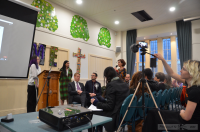
“Young people like me are bearing the brunt of Covid 19 with big job losses. The pressure to find an income, but rejection after rejection as I apply for jobs, takes away my motivation. Then I look at the competition I face and I feel hopeless.”
These were the words of Sarah-Jane Seddon, the first of four young voters asking the questions to Party candidates last night at the Child Well-Being election forum focused both on inequities of health outcomes for children and young people’s rising mental health issues.
Sarah-Jane made a connection between the impact of a pandemic on New Zealand’s already broken health and disability system and the future job prospects of young New Zealanders.
“It seems to me that two problems might be solved at once – one the job prospects of young people, the other our health and disability system and thereby the well-being of our nation – if government majorly invested in health sector training and education.”
All six Parties answered positively to her challenge with various policy strategies. Minister Chris Hipkins of Labour introduced the concept of “micro-credentials” for health workforce training, such as learning to perform vital Covid 19 swabs to serve contact-tracing. Alfred Ngaro, representing National, spoke of privatising the health workforce to make it independent from government’s constraints and standards. Focusing on Sarah-Jane’s ethnicity, Green Party co-Leader Marama Davidson made note of the higher impact of job losses for Maori and Pacific women with a promise of equitable investment in both jobs training in health and mental health.
Leilani Naufahu came to the podium to speak for her older brother with epilepsy, and spoke of the racist attitudes preventing his fair treatment inside the system.
“My brother may never be cured of epilepsy, but this doesn’t mean the system should just give up on him. When his condition means he has to miss out of so many opportunities, surely the way he is treated by the health system shouldn’t make him miss out on more.”
Her question however was about the cost burden for her family, of having a long-term condition with persistent need of medication and treatment.
“Will your Party provide universal free primary healthcare to ALL children and young people no matter their illness, so that parents like mine aren’t burdened with what it costs long term to raise healthy children?”
Once again all Party candidates but Act answered with a “yes”, however for most it was more of a “yes but”. Numerous free services that are already introduced were boasted about by the major Party representatives but they stumbled on the timeframe for making children’s healthcare universally free.
“To be frank the minor Parties were more interesting. Jessica Hammond of TOP spoke of ring-fencing tax-takes from junk food and cannabis consumption – if the referendum gets a Yes vote – to pay for more free healthcare,” said Dr Prudence Stone, one of the event organisers. “Grae O’Sullivan of Act spoke of reducing the number of DHBs to free up money spent on unnecessary health bureaucracy. While you might not agree with them, these are at least practical policy solutions focused on the fiscal challenge Leilani brought to the candidates.”
Stacey Ryan and Thomas Lamont-Smith came to the podium to challenge the candidates specifically about the “mental health pandemic” among young people in New Zealand.
“I’m going to be blatant with you, the mental health system in this country is appalling. One in six kiwi students have reported a suicide attempt in the past year. Over half of openly LGBT youth have reported symptoms of depression and anxiety,” said Thomas. “In addition LGBT minorities have had mixed experiences of support within mental health services. I found that autistic LGBT people are not taken as seriously in a medical setting due to the practitioners’ pre-existing biases, in conjunction with inadequate education and training.”
“We say we want New Zealand to be the best place in the world to be a child. We are a long, long way from that target. The rapid rise in mental health concerns among young people over the last decade cannot be ignored,” added Stacey Ryan, a youth representative of United Community Action Network. “There is an urgent need to identify youth-specific risk and protective factors to inform effective prevention strategies that can be implemented from early childhood.”
Once again, the Party representatives all answered in agreement, with varying approaches for how to tackle the problem. NZ First’s Tailor Arneil promised more counsellors in the primary and secondary school setting, as well as addressing bullying in social media, although he was not specific how.
“The most interesting answer of the night for me came from the Minister of Health when he spoke about New Zealand’s ‘tyranny of happiness’ in our culture,” said Norma Mclean, first time voter and Twitch cameraperson for @RaiseYourVoices. “I related totally with him about our education system focusing on academic success and NCEA achievement, without recognising the value of failure for learning. He may not have had any solutions within mental health or healthcare, but I couldn’t have agreed more with him about where this mental health pandemic starts.”
The Child Well-Being Election Forum can be viewed on the Tick for Kids Facebook page or on Twitch @RaiseYourVoices.